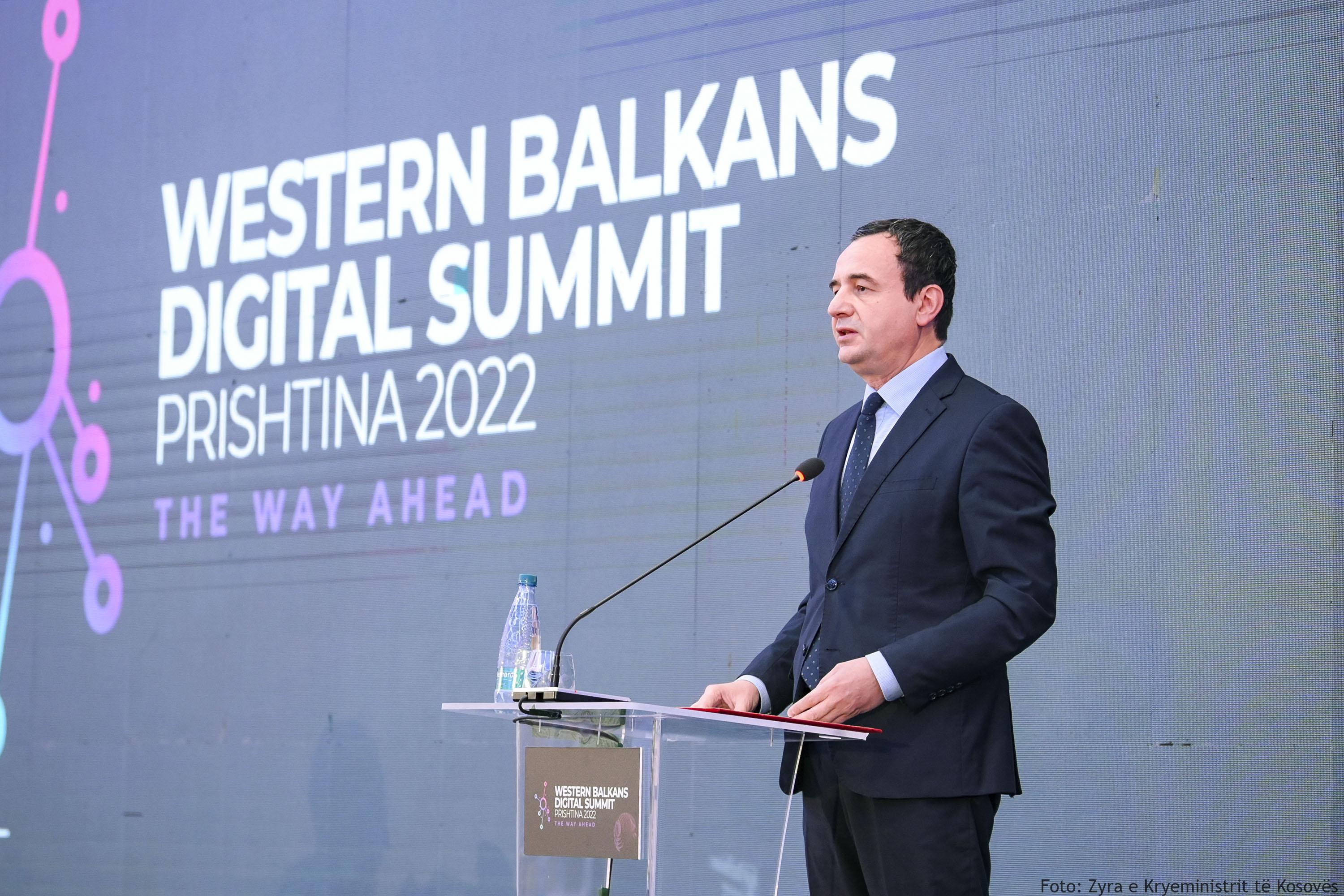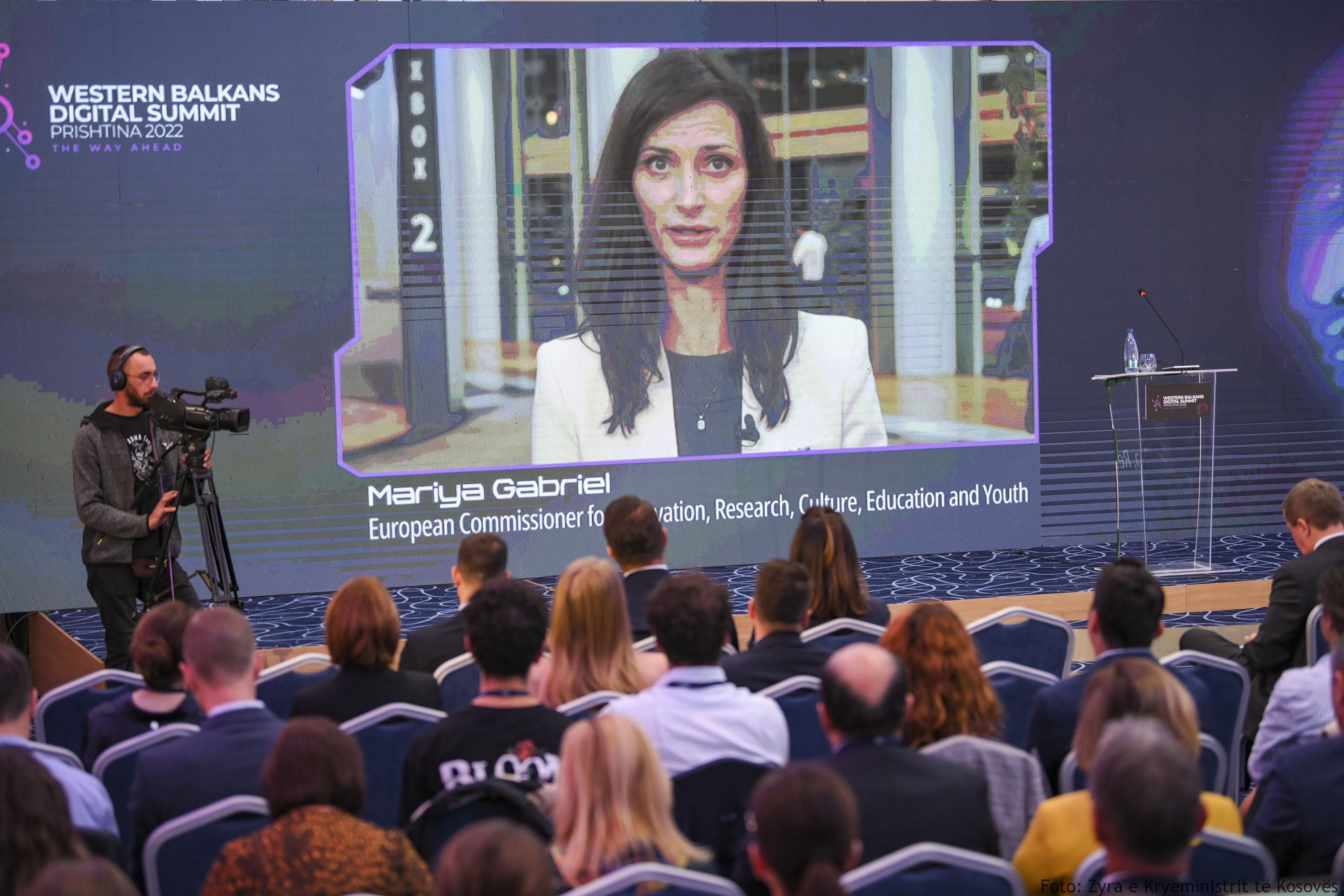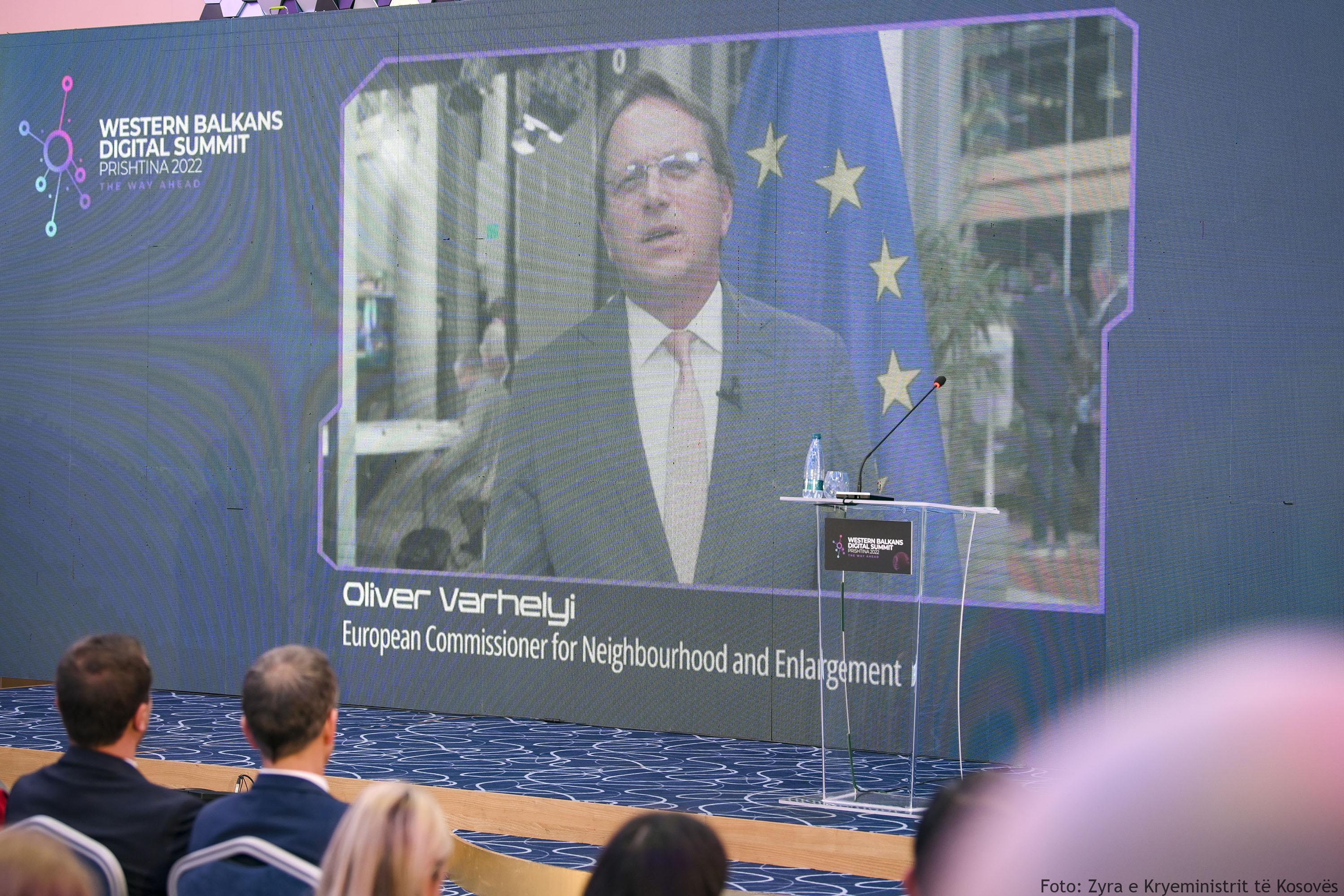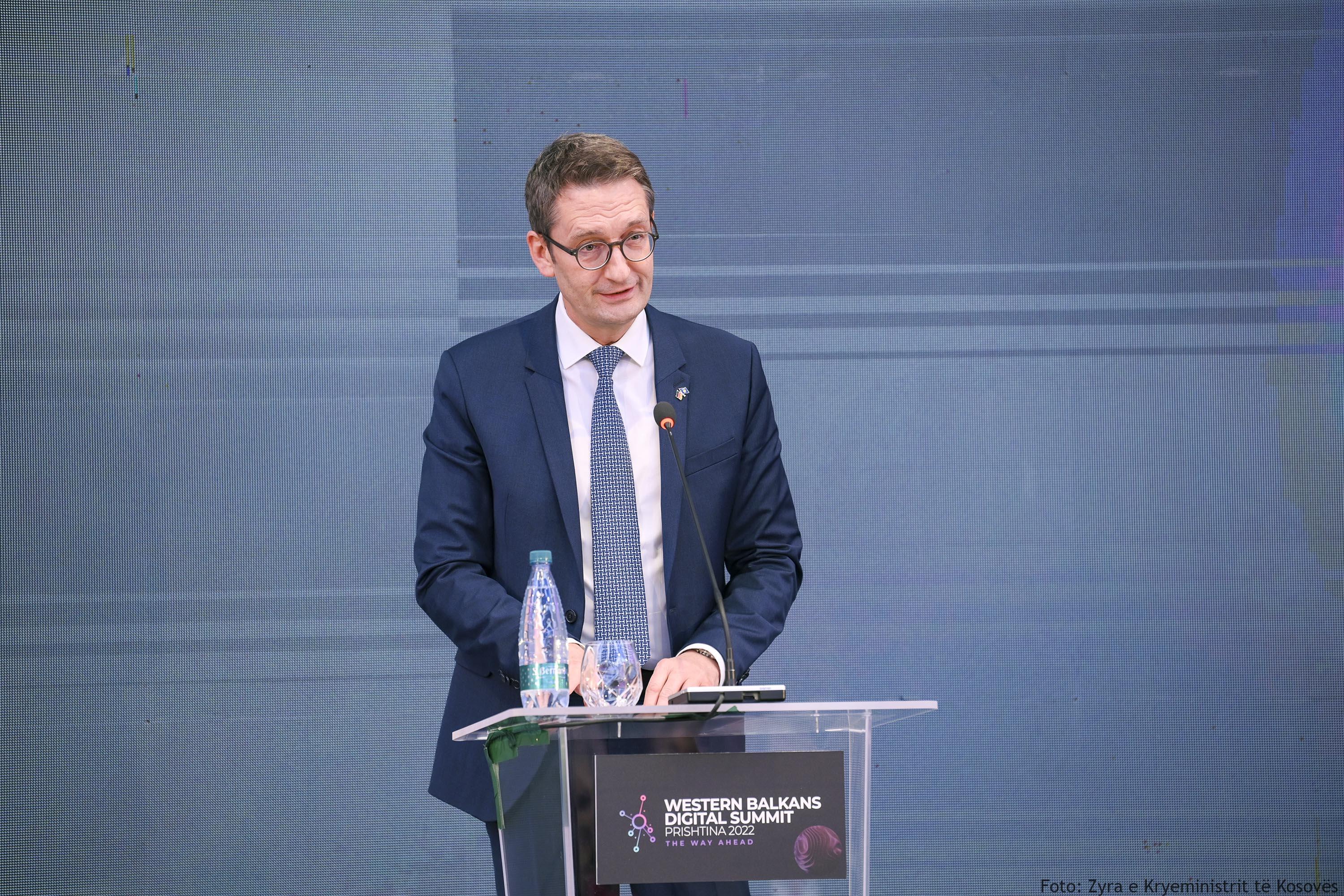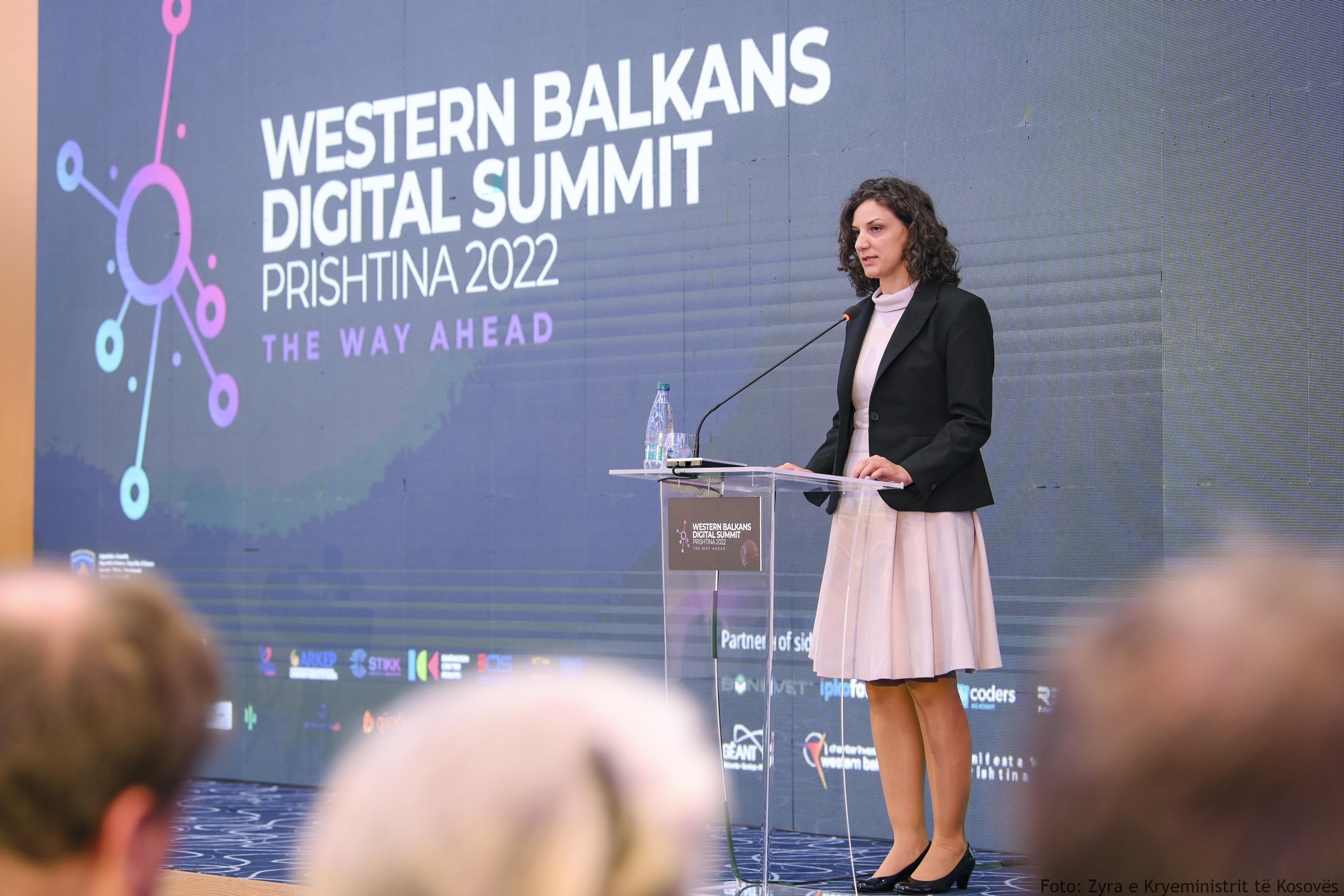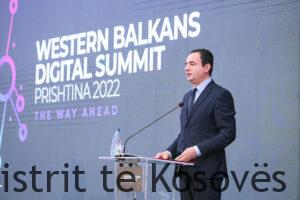Pristina, September 21, 2022
Launched within the framework of the Berlin Process, and organized in cooperation with the Regional Cooperation Council (RCC), the Western Balkan Digital Summit is the largest regional ICT event, that brings together the government, the private sector and the academia representatives, and connecting them with the ICT community from the Western Balkans, the EU and beyond, said the Prime Minister of the Republic of Kosovo, Albin Kurti, at the opening of the summit.
Emphasizing that the digitization is one of the major priorities, he stressed out that the Government is working on creating the electronic services that consider the citizen as a central-point, and which provide the increased governance transparency and accountability, improve the quality of services, and facilitate the citizens lives.
Speaking about the human component of the digital transformation, the Prime Minister emphasized that the population is our greatest national potential. With our tech-savvy youth, vibrant ICT sector and the entrepreneurial spirit of our ICT community, we have some of the key elements for successful implementation of digital transformation, he added.
The Prime Minister highlighted that with the Government’s commitment to socio-economic development and the transformation towards a knowledge-based economy, our intention is to slow down the brain drain, and to return the brain (brain-return), through initiatives that will help to unlock the potential of our diaspora.
By highlighting the digital skills, digital connectivity, digital economy and cyber security as opportunities and challenges of our country, he pointed out that the challenges faced by other countries of the Western Balkans are similar.
This edition of the Digital Summit will provide an opportunity for the Western Balkans countries to continue and advance the discussion on the expansion of cooperation in areas, such as the interoperability, digital identity, free flow of data and cyber security, said the Prime Minister. Meanwhile, he added that the Summit will also help pave the way for the integration of the Western Balkans into the Pan-European digital market.
Prime Minister’s Kurti full speech at the opening of the summit:
Dear Ministers,
Dear representatives from the EU and the Western Balkans,
Dear members of the ICT community,
Dear guests,
Ladies and gentlemen,
On behalf of the Government of the Republic of Kosovo, it is a great pleasure to host the 5th Western Balkan Digital Summit. Launched within the framework of the Berlin Process, and organized in cooperation with the Regional Cooperation Council (RCC), the Western Balkan Digital Summit is the largest regional ICT event, that brings together the government, the private sector and the academia representatives, and connecting them with the ICT community from the Western Balkans, the EU and beyond.
Digitization is one of the main priorities of our government. We are working on creating the electronic services that consider the citizen as a central-point, and which provide the increased governance transparency and accountability, improve the quality of services, and facilitate the citizens lives. We intend to use digital transformation as an impetus to reform our public administration, improve the quality of our education system, increase the efficiency of the health and justice systems, and contribute to the improvement of all areas of governance. And with the wider digitization in the economy, including the government and business digital transformation, we aim to increase productivity and socio-economic growth.
It is the people, and not the technology itself, that is the most important element that will make or break the success of this digital transformation. And population is our greatest national potential. With our tech-savvy youth, vibrant ICT sector and the entrepreneurial spirit of our ICT community, we have some of the key elements for successful implementation of digital transformation. However, like many other countries, we are also facing the brain drain challenge. The global demand for highly skilled ICT professionals, which has never been higher, provides opportunities for our skilled youth to emigrate and pursue their careers abroad. So, with our commitment to socio-economic development and transformation towards a knowledge-based economy, we aim not only to slow down this brain drain trend, but also to try to reverse it through brain return initiatives, which will help to unlock the great potential of our diaspora in the EU and the USA.
When we talk about the human component of digital transformation, we should not only be concerned about the digital professionals. We also need to consider the people who will be using the digital technologies and systems, and the digital skills they are expected to have. Therefore, we need to consider the necessary digital skills for civil servants, teachers and doctors, and ultimately the digital skills of our citizens. This implies the need to engage in upskilling and reskilling programs and initiatives that will help addressing the digital skills mismatch and increasing the digital skills in our society.
So much progress has been made in improving the digital infrastructure and connectivity within our country. With the internet penetration covering over 99% of households, Kosovo scores better results compared to other countries in the region, even to the EU average. However, so much remains to be done in improving the digital infrastructure and connectivity in schools and hospitals. And we are ready to take the first steps towards opening the doors to the piloting and implementation of 5G networks.
The pandemic has given an immense boost to the growth of the digital economy. E-banking has now become the main channel for banking services and the use of e-commerce has increased significantly. The implementation of “Digital Identity” – a project we are starting soon with the EU support – will give a significant impetus to the development of digital governance and the digital economy.
Advancing the national interoperability between the government systems will also open the door to more e-services provided by the private sector. However, many of our non-ICT businesses, especially SMEs, lack the capacity to engage in digital transformation, and this is another area that requires our joint attention.
As we tend to become more digital, we are also becoming more vulnerable to cyber-attacks. Cyber-attacks have the potential to not only bring down websites and degrade or prevent access to services, but also to severely impact critical infrastructure operations and harm the national security. And the cyber-attacks are not a potential distant threat, they are our daily reality: two weeks ago, our government was a target of the cyber-attack; a week later, our public Telecom operator was also attacked. So, the continuous addressing of the cyber security and taking measures at the political and operational level is an indispensable component of the digital transformation.
All these opportunities and challenges – digital skills, digital connectivity, digital economy and cyber security – are not limited only to Kosovo. Few weeks before our government systems were attacked, Albania was also the target of a severe cyber-attack on its government systems, and Montenegro was also a target. Recently, an energy provider in Bosnia and Herzegovina was also attacked. Consequently, the digitalization challenges we face are quite similar to those faced by other Western Balkans countries. And so are the opportunities.
The Western Balkans Digital Summit provides an excellent forum to share knowledge and experience among the Western Balkans countries. An important achievement of the previous digital summits is the implementation of “roam-like-at-home” within the Western Balkans, as it has made communication between people in our region cheaper and easier. The roadmap for reducing roaming charges between the Western Balkans and the EU is another important step forward that will bring benefits to our citizens and businesses. This edition of the Digital Summit will provide an opportunity for the countries of the Western Balkans to continue and advance the discussion on the expansion of cooperation in areas such as interoperability, digital identity, free flow of data and cyber-security.
The summit will also help to pave the way for the integration of the Western Balkans into the Pan-European digital market.
I would like to thank our Ministry of Economy for the commitment in the preparation of this edition of the summit.
I wish the participants many productive discussions and a successful 5th edition of the Western Balkans Digital Summit.
Thank you and welcome again.

